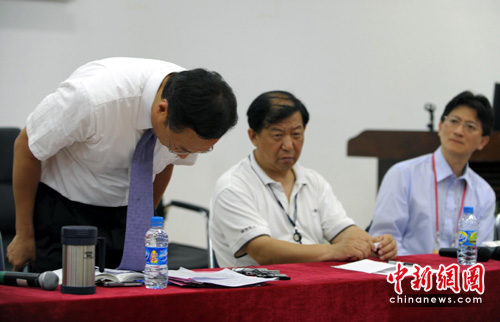Society
- Details
- By David Cao
- Hits: 721
The head of Foxconn bowed and apologized on Wednesday for a string of suicide attempts in Foxconn Technology Group, and led a rare damage-control media tour to the factory complex in Shenzhen.

Terry Gou (1st L), founder of Foxconn, bows during a news conference for the Foxconn suicide incidents in the township of Longhua in the southern Guangdong province May 26, 2010.
"I'm very concerned about this. I can't sleep every night," said Terry Gou, Foxconn Technology Group chairman.
"From a scientific point of view, I'm not confident we can stop every case. But, as a responsible employer, we have to take up the responsibility of preventing as many as we can."
The past five months witnessed 12 suicides attempts at Foxconn, most of which the company attributed to personal problems.
Family members of one of the victims - Ma Xiangqian, who jumped from a building to his death in January - protested outside the factory on Wednesday.
- Details
- By David Cao
- Hits: 914

Honda's sparepart factory is suffering the lasting strike which results its production paused.
Read more: Honda China assembly factory stop running for striking
- Details
- By David Cao
- Hits: 2158

- Details
- By David Cao
- Hits: 2157
Chinese Netizen Has launched a campaign to find out which is the most beautiful Show Girl on 2010 Beijing Auto Show, Infiniti's show girl is not the No.1.
- Details
- By David Cao
- Hits: 1084
Benz Must have spent a lot of time on finding the right show girl willing to act as movie avator on Beijing Auto show 2010.
This is the most alien show girl on this Beijing Auto show.
More Articles …
Page 154 of 255


